|
The NCSM INSIDER is published monthly. Please consider forwarding this to a colleague—let's get everyone involved in the conversation!
NCSM...Where Mathematics Leaders Go To Learn
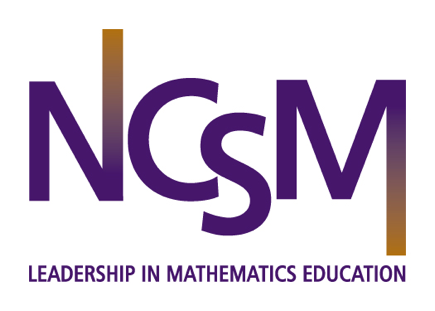
Super Summer Leadership Academy “Adventures in Virtual Learning”
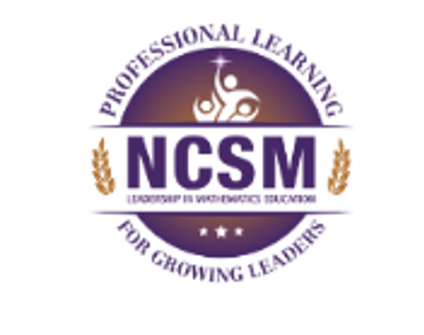
The NCSM Summer Leadership Academy went virtual and was a sold out success!
For three days, June 29-July 1, 2020, participants zoomed in for synchronous opportunities to hone their coaching skills and learn from others with the theme, Mathematics Leaders: Agents of Change for ALL Learners. Vision. Influence. Action.
The NCSM Essential Actions Framework book was used to anchor the learning each day with learning experiences chunked into roughly hour-long segments followed by short breaks.
The participants also explored a variety of online tools such as Google Docs, Google Slides, Jamboard, Mentimeter, and Slido to make the virtual experience more collaborative and interactive. Additionally, the tools within the Zoom platform were used to maximize participation and engagement.
Feedback from participants included:
- Lots of ideas, time to develop it and reflect with others.
- I got to see a way that virtual learning can be successfully used. SLA encouraged me to be more bold in leading my department in following more of the mathematics teaching principles.
- I think the virtual environment modeled for me what the future of facilitation is going to look like.
- Provided tools and modeled their use (and the use of tech) for leading PD.
- it empowered and gave me tools to have hard, bold conversations and to advocate for equity for all students
- Giving thoughtful guidance into how to support teachers through feedback and empowerment
- Thank you for honoring our need for collaboration. I came away with new relationships and new resources that I can use to continue the work we started this week. I feel empowered by the content of the summit and the small group work conversations!
As we look back on our SLA adventure, we realized that despite challenges, we all can be BOLD leaders in an incredibly challenging time. Even though many of us cannot meet face to face, important work can still be completed each and every day. Mission Accomplished!

And...we thank the CPM Educational Program for their support as our sponsor for the 2020 Summer Leadership Academy
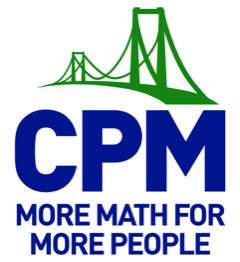
From Mona Toncheff, NCSM President, and Gina Rivera and Jenny Novak, NCSM Professional Learning Co-Directors
Spring NCSM Inspiration! online for members
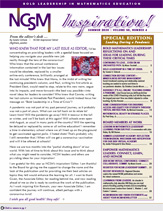
In the Spring issue, NCSM provides ideas and resources to help you think about and plan for school during a pandemic.
Don’t miss this different issue of the NCSM Inspiration: Leading During a Pandemic.
The NCSM Inspiration! is available to all members and can be found HERE along with the latest issue of the NCSM Journal.
From Gwen Zimmerman, and Kim Romain, NCSM Inspiration! co-editors
All NCSM members are automatically subscribed to NCSM's Insider. Anyone can subscribe to this electronic newsletter (members and non-members).
Encourage others to subscribe. Forward this issue to your friends and colleagues who work in or have an interest in mathematics education leadership - or have them click here where they can subscribe themselves.
Insider Editor
Pat Baltzley is pleased to be the NCSM Insider editor.
Please feel free to contact Pat with news, feedback, or suggestions.
|
July 2020 Message from the NCSM President, Mona Toncheff
Time to Be Still
“We must cultivate mental stillness to succeed in life and to successfully navigate the many crisis it throws our way.”
- Ryan Holiday
Summertime is my time to relax, spend time with family and catch up on my reading. I love to read and learn new strategies or get lost in a good story. A friend gave me a book for Christmas and I finally had time to sit down to read it this summer. Ironically, the title is “Stillness is the Key” by Ryan Holiday.
In the book, stillness is defined as, “to be steady while the world spins around you.” (Holiday, 2019, p. XV). Since March, there has not been much time to be still and my work life has grown incredibly noisy. I travel for work and, though I have been home since March 13th, I feel like I have been busier than ever. I know this feeling is mutual as I have spoken to many colleagues and moving work to the virtual world has taken a toll. Finding time to be still sometimes feels out of reach.
As I read the first chapter, the following questions resonated with me.
…If the leader can’t take the time to develop a clear sense of the picture, who will? If the leader isn’t thinking through all the way to the end, who is?
As mathematics leaders think about the 2020-2021 school year, what is the big picture and what do we want mathematics learning to look like at the end? Unfortunately, we are answering this question while dealing with two different pandemics, COVID-19 and systematic racism. We may want to return to normal as a sign COVID-19 and its atrocities are behind us. But the truth is, systematic racism shows our old normal was not working for all students. Now is our opportunity to create and embrace a new normal.
Since March, we all have had to respond to the same storm, however, we are all not in the same boat. We serve peers, teachers and students who are dealing with loss. These losses differ based on each individual’s experience and, as we plan for the upcoming school year, we need to be cautious about any assumptions we make regarding those we serve. Instead, let’s find stillness. And in that stillness, we can stop to reflect, learn, focus, and re-energize for the 2020-2021 school year with an outcome of mathematics learning for every student.
Consider taking time to cultivate mental stillness this month and ponder questions like those below.
- How will we embrace a strength-based view of learning? Rather than use deficit language to describe a student’s learning, how can we focus on the evidence of what is being learned versus what is not?
- How will we focus on essential content and maximize instructional time? Instead of trying to “get through” the standards and constantly assess, how can we focus on using formative assessment processes to provide quality feedback that empowers learners?
- How will we repair students’ relationships with mathematics? Instead of employing strategies that isolate mathematics concepts, how will we develop strategies that highlight student thinking in a blended learning experience? How will we foster student agency and a positive mathematical identity?
Life has definitely thrown one crisis after another our way. Yet, as leaders, in the stillness we can reflect, clarify our vision, and begin anew. The students in 2020-2021 deserve a high-quality mathematics education. The teachers in 2020-2021 need to know there is a plan. Break through the noise with stillness and consider how to empower those you serve in the upcoming school year.
From Mona Toncheff, NCSM president
A Call for Manuscripts for the NCSM Journal
The editors of the NCSM Journal of Mathematics Education Leadership (JMEL) are interested in manuscripts!
The editors are particularly interested in manuscripts that bridge research to practice in mathematics education leadership. Manuscripts should be relevant to our members’ roles as leaders in mathematics education, and implications of the manuscript for leaders in mathematics education should be significant.
At least one author of the manuscript must be a current member of NCSM. Categories for submissions include:
- Case studies and lessons learned from mathematics education leadership in schools, districts, states, regions, or provinces
- Research reports with implications for mathematics education leaders
- Professional development efforts including how these efforts are situated in the larger context of professional development and implications for leadership practice
- Other categories that support the NCSM vision will also be considered.

Submission Procedures
Each manuscript will be reviewed by two volunteer reviewers and a member of the editorial panel. Manuscripts should be emailed to the Journal Editors, currently Drs. Brian Buckhalter and Erin Lehmann, at [email protected].
Submissions should follow the most current edition of APA style and include:
-
A Word file(.docx) with author information (name, title, institution, address, phone, email) and an abstract (maximum of 120 words) followed by the body of the manuscript (maximum of 12,000 words)
- A blinded Word file (.docx) as above but with author information and all references to authors removed.
To view a current copy of the NCSM Journal, the PDF of the Spring 2020 issue can be downloaded or viewed HERE.
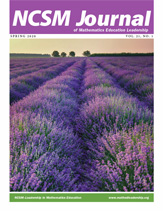
From Brian Buckhalter, Journal editor, and Erin Lehmann, Associate Journal Editor
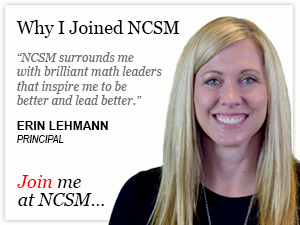
JOIN TODAY!
|